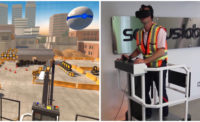In a step forward for promoting the use of virtual reality training for heavy equipment operators, Skyjack has announced that it is collaborating with VR developer Serious Labs on VR training for scissor lifts.
“From a Skyjack perspective, we believe training in the industry is one of the best ways to prevent injuries, and anything to advance that is appreciated,” says Brad Boehler, president, Skyjack. The new VR training scenarios will be designed around Skyjack’s scissor lifts, but will applicable to any comparable scissor lift’s operation.
Serious Labs specializes in immersive VR training, often involving not only a headset but a full recreation of the relevant work platform or cab. Controls are designed to mimic the actual equipment, and the VR headset and sensors track where users are looking and what motions they are making. The training simulations are based around pre-made scenarios, allowing for operators to experience complex problems that are difficult to test on real equipment. “VR is a great way to train people by putting them in risky situations that you wouldn’t want to put them in normally,” says Boehler. This can include dangerous scenarios such as operating a lift near power lines or working under high wind loads.
Simulations of working at height are nothing new for Serious Labs. The Edmonton, Alberta-based tech firm has been developing VR simulations for cranes and aerial lifts for years, but the partnership with Skyjack has the company scaling up its production. “As we launch this scissor lift training, we’re coming into the public view,” says Jim Colvin, CEO, Serious Labs. “But we still think you don’t really get VR until you’ve tried VR.”
In addition to Skyjack, Serious Labs has an ongoing partnership with United Rentals, and is looking to deploy VR training kiosks in United Rentals sites across North America. “We see the future of training in using technology like virtual reality—that’s the tech that’s the most readily available—that scales well with number of locations and type of business with our customers,” says Jim Dorris, United Rentals vice president for environmental health and safety. “The next evolution for training is to bring virtual reality in, and see it take a role in a more practical evaluation.”
Dorris says that while VR will never fully replace training on actual equipment, it will allow for operators to be tested on their competence, and could increase the pipeline of qualified operators at a time the industry is facing a workforce shortage. “This is the first of many VR simulations we will develop with Serious Labs,” he says. “We have plans for a full catalog of simulations. Serious Labs already has full simulators for aerial booms and scissor lifts, and we will work to develop them for forklifts and other equipment.” Currently United Rentals in planning to deploy Serious Labs’ VR simulators in several pilot locations across the U.S. and Canada.
The training simulations are designed around the safety standards developed by ANSI and the International Powered Access Federation. Serious Labs has an ongoing partnership with IPAF to bring its VR training simulators to a broader audience. “Our centers train 200,000 operators a year on MEWPs (mobile elevated work platforms) or aerial lifts,” explains Tim Whiteman, CEO and managing director, IPAF. “This VR technology can compliment that existing training. As an industry we need to develop a strategy on what simulators can be used for. Is is possible to train someone entirely on a simulator for a mobile work platform? We need to see what the industry can do with this technology.” Whiteman says IPAF is surveying its instructors about interest in VR, and is planning a demonstration at its annual summit in Miami in March.
In addition to training more operators, Serious Labs and industry partners like Skyjack also expect recorded data of operators in VR will pay dividends for designing training programs and even future machines. “Any type of data feedback we can get that gets us info on the ergonomics of where people are looking is great, we don’t have that data right now,” explains Skyjack’s Boehler. ‘We can make training profiles public, and we have a strong interest in showing what operators capabilities are.”
With a strong demand for equipment operators, better documentation of skill levels is in demand, says United Rentals’ Dorris. “Through United Rental academy, we will be able to take positioning data on individual workers during training, and the vast majority of our equipment has full telematics. We can tie that all together for a score or rating on that individual operator.”
“It is conceivable that these simulators could be made able to read license cards we issue,” says IPAF’s Whiteman. “We have machine-readable license cards, so those powered access license cards, could log your total time on a simulator.”
“We designed the technology for this conversation,” says Colvin. “All the measurements, where they look, how they handle the controls, we already capture that data, ready to hook up to a system that records all that.
But for now, Serious Labs is focusing on building out the machines covered by the VR training and designing scenarios to meet trainers requirements. “The goal is increasing the number of operators in the field, having the best people out there while improving safety,” says Colvin. “It’s all about making sure people get home safely at night.”





